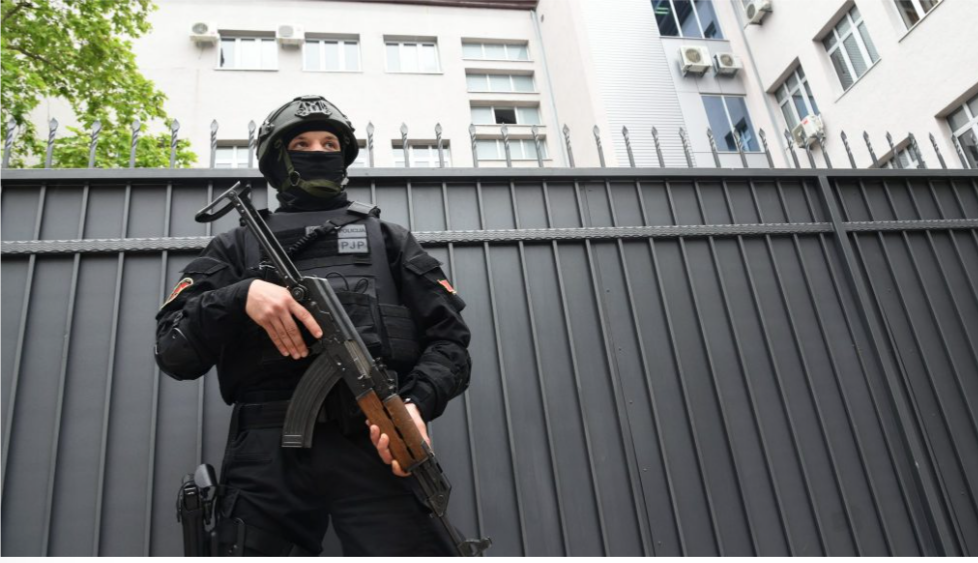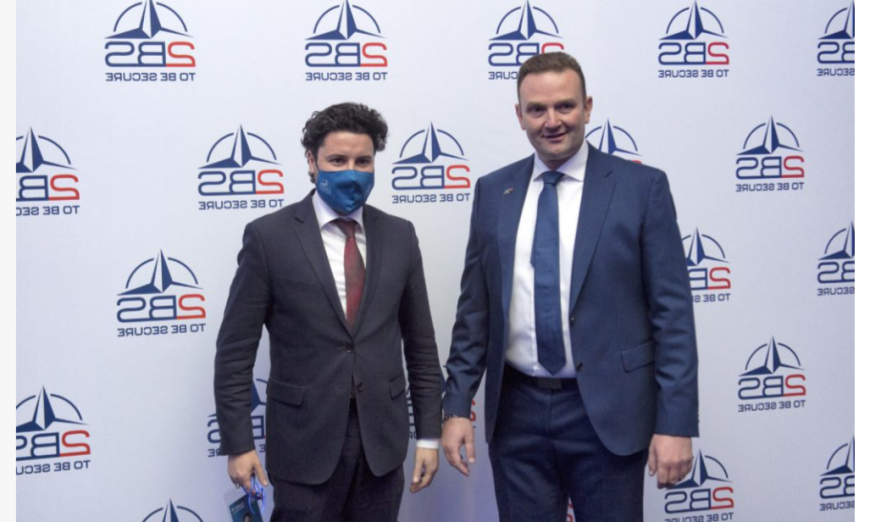Podgorica, BIRN. September 29, 2022
Montenegrin Prime Minister Dritan Abazovic (left) and head of National Security Agency Savo Kentera (right) in Budva. Photo, Atlantic Council of Montenegro.
Montenegro’s outgoing Prime Minister, Dritan Abazovic, said on Thursday that the Special State Prosecution had launched an investigation into an unspecified number of people on charges of espionage and creating a criminal organization.
Media reported that police had already detained six Russian diplomats, 30 Russians with temporary residence permits and two Montenegrins, on suspicion of working for Russian intelligence.
Abazovic told the media that action was being organized with Western partners, and refused to say if it related to his official visit to the US last week.
“Searches are carried out at several locations and the action is international in nature. We are ready to protect the national interests of Montenegro,” Abazovic told the media.
The Special State Prosecutor spokesperson, Vukas Radonjic, insisted that police were only searching premises, stressing that no one had been arrested yet.
“There were no arrests so far, so I urge media and public figures to respect the presumption of innocence.
Their statements about the ongoing proceedings must not violate the rights of citizens who are being searched,” Radonjic told the public broadcaster.
In his interview for Fox News on September 17, Abazovic said that Montenegro was under negative political and economic pressure from Russia and China, stressing that the US can counter that influence in Western Balkan countries.
While the opposition Democratic Party of Socialists DPS and Social Democrats welcomed the prosecution investigation, Interior Minister Filip Adzic said, “We are doing everything to rid Montenegro of any external negative influence and clean the system. These activities are aimed at protecting the national interests of Montenegro.”
Despite strong historical ties, relations between Russia and Montenegro have cooled, particularly since 2014, when Montenegro, seeking membership of NATO, joined previous sanctions imposed on Russia by the EU and the United States over its annexation of Ukraine’s Crimean peninsula and involvement in the fighting in eastern Ukraine.
Ties frayed further in 2016 when Montenegro accused Russia of sponsoring a failed coup attempt allegedly designed to stop Montenegro from joining NATO.
In May 2019, Montenegro’s Higher Court sentenced 13 people, including two leaders of the pro-Serbian Democratic Front, two Russian intelligence officers and eight Serbs to custodial sentences of up to 15 years for staging the attempted coup.
But on February 5, Montenegro’s Appeal Court annulled the first-instance verdicts issued in the so-called “plot coup” trial, asking the Higher Court to repeat the trial that former opposition leaders claimed was politically led from start to finish.
After the government’s decision to join European Union sanctions against Russia, on March 7, Russia added Montenegro to a list of “enemy states”.
Since March the Foreign Ministry has declared several Russian diplomats personae non grata.
On August 26, the National Security Agency accused Russia of massive cyber-attacks on the government server, which forced the public administration to work offline mode for more than a month.
Russian Foreign Ministry spokeswoman Maria Zaharova on September 1 dismissed Podgorica’s claims as part of a “continuous policy of dismantling relations with Moscow in order to please the United States” Montenegrin officials have since blamed a criminal extortion group, Cuba Ransomware.
Opinion in Montenegro is divided about Montenegrin policy on Russia. The country has a large Serbian population, which is traditionally sympathetic to Russia.

A police officer guards the High Court in Podgorica. Photo: EPA-EFE, BORIS PEJOVIC

